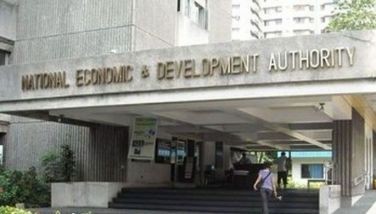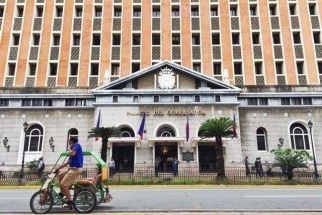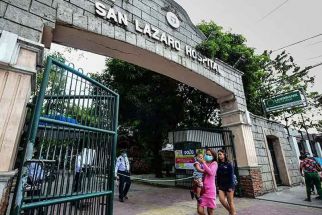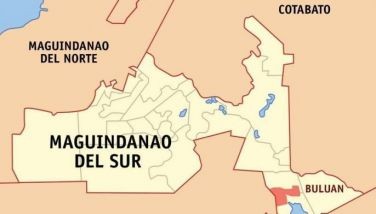Farmers submit 50,000 signatures to House vs rice tariffication law
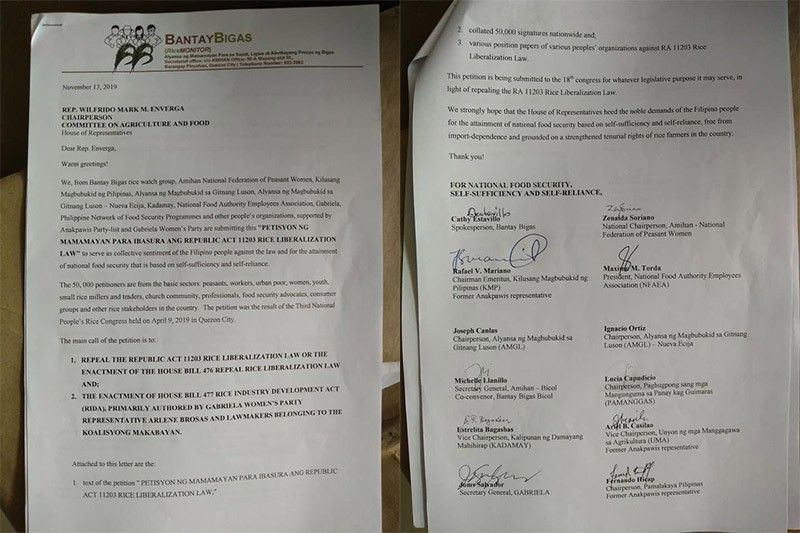
MANILA, Philippines — Farmers groups on Wednesday submitted to the House of Representatives a petition with 50,000 signatures calling to repeal Republic Act 11203, or the Rice Tariffication Law.
The petition, submitted to Rep. Wilfrido Enverga (Quezon), who chairs the Committee on Agriculture and Food, was initiated by agricultural organizations Bantay Bigas and the National Federation of Peasant Women (Amihan) along with other stakeholders.
Signatures were gathered across the country since October, especially in top rice-producing provinces like Nueva Ecija, Isabela, Pangasinan, Cagayan, Iloilo, Camarines Sur, Tarlac, and Leyte, according to an Amihan Women release.
“We strongly hope that the House of Representatives heeds the noble demands of the Filipino people for the attainment of national food security based on self-sufficiency and self-reliance, free from import-dependence and grounded on strengthened tenurial rights of rice farmers in the country," the petition read.
The petition will also be submitted to House Speaker Alan Peter Cayetano (Taguig).
Finance Secretary Carlos Domniguez III said Wednesday that the government is not inclined "to repeal, revise or suspend the Rice Tariffication Law."
"We are confident that this is the best means to move our agriculture forward and foster competitiveness," he said.
What is RTL?
The Rice Tariffication Law removed quantitative restrictions on the volume of imported rice, imposing tariffs on rice imports instead. This allows anyone to import rice as long as 35-45% in import taxes are paid.
Bantay Bigas, which monitors rice prices, said removing the limits on rice importation has hurt farmers through low palay prices.
The group recorded prices P10 to P12 per kilogram of palay in some areas and as low as P7 per kilogram in Isabela and Tarlac provinces.
“Isasangkalan ng pribadong sektor ang pagbaha ng imported na bigas, para tuluyang baratin ang presyo ng palay, maging sa antas ng pagkalugi ng mga magsasaka,” Bantay Bigas said in a briefer.
(The private sector risks the influx of imported rice, which would impair the domestic industry and plunge local rice farmers into debt.)
In the span of three years, the Philippines quadrupled its rice imports from 800,000 metric tons to an anticipated three million in 2019. The country recently beat China as the top global importer of rice, according to a report by the US Department of Agriculture-Foreign Agricultural Service.
“Malinaw ang panawagan ng mga magsasaka, mamimili at ng mamamayan...Bawat isang pirma ay puno ng pag-asa na pakikinggan ng mga mambabatas ang boses ng maliliit na mamamayan, lalo na ng mga magsasaka, na labis na napinsala ng liberalisasyon,” Bantay Bigas spokesperson Cathy Estavillo said.
(The demands of farmers, consumers, and citizens are clear...each signature is full of hope that lawmakers will listen to the voice of the ordinary people, especially farmers who bear the brunt of liberalization.)
Alternatives sought by farmers
House Bill 476, filed in July by Rep. Arlene Brosas (Gabriela Women’s Party) and other Makabayan solons, would repeal RA 11203, also called the Rice Liberalization Law.
"The local rice industry accounts for around one-fifth of the gross value added of Philippine agriculture, providing livelihood for over 2.5 million households and millions of farmers and workers for post-farm and ancillary activities. The signing of the rice tariffication law, however, presents the single biggest threat to farmers, local rice production and to consumers as well,” the bill’s explanatory note reads.
HB 476, however, is still pending at the Committee on Agriculture and Food.
Estavillo said the government has consistently been ignoring the calls of farmers by favoring dole-out programs instead of directly addressing rice liberalization and its consequences.
“More than seven months have passed after the law’s implementation, farmers have already been bankrupt for two cropping seasons but the Duterte government has only provided P15,000 loans for farmers owning one hectare of land below and a commitment to give P5,000 worth of ‘cash gift’ this December,” Estavillo said.
“Parang pulubi ang trato ng gobyerno sa ating mga magsasaka samantalang sila ang nagpapakain sa sambayanang Pilipino.”
(The very farmers that feed Filipinos are treated like beggars by the government.)
The signatories instead call for the passage of HB 8512, or the Rice Industry Development Act, to replace the Rice Tariffication Law.
The bill was filed during the 17th Congress by Rep. Ariel Casilao (Anakpawis party-list) and other Makabayan bloc lawmakers.
Among the bill’s aims, according to the Bantay Bigas briefer, are providing a budget for a rice development program which would form a system of socialized credit, irrigation development, post-harvest facilities, and direct support to farm inputs. HB 8512 will have to be refiled in the 18th Congress, which began its first regular session in July.
- Latest
- Trending















